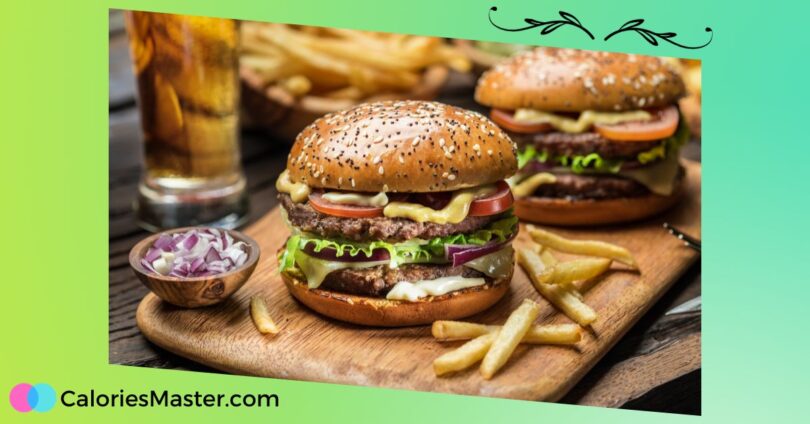Hamburgers are a popular fast food item that many people enjoy. However, with the rise of health consciousness, people are starting to question the impact of hamburgers on their weight loss goals. The question remains: are hamburgers bad for weight loss?
When it comes to weight loss, it’s important to consider the nutritional value of the food you eat. Hamburgers are typically high in calories, fat, and sodium, which can make it challenging to fit them into a healthy diet.
Additionally, many fast food restaurants offer larger portion sizes and combo meals that can quickly add up in calories.
On the other hand, hamburgers can be a part of a balanced diet if consumed in moderation and with healthier toppings and sides. It’s also possible to make homemade hamburgers using leaner meats and whole grain buns, which can be a healthier alternative to fast food options.
Ultimately, the impact of hamburgers on weight loss depends on the individual’s overall diet and lifestyle choices.
Nutritional Composition of Hamburgers
What nutrition do hamburgers have? Let’s find out.
Caloric Content
Hamburgers are known for being high in calories. The amount of calories in a hamburger can vary depending on the size of the patty and the ingredients used to make it. On average, a plain hamburger patty (100g) contains around 250-300 calories.
However, when you add toppings such as cheese, bacon, or sauces, the calorie count can quickly add up. A typical fast-food burger with cheese and a bun can contain anywhere from 500-1000 calories.
Macronutrients
Hamburgers are a good source of protein, but they are also high in fat and carbohydrates. A 100g hamburger patty contains around 15-20g of protein, 20-25g of fat, and 15-20g of carbohydrates.
The type of meat used to make the patty can also affect the macronutrient content. For example, a beef patty will have more fat than a turkey or chicken patty.
Micronutrients and Additives
Hamburgers are not typically a good source of micronutrients such as vitamins and minerals. However, some fast-food chains have started to add vegetables like lettuce, tomato, and onion to their burgers to increase their nutritional value.
It is also important to note that many fast-food burgers contain additives such as preservatives, artificial flavours, and colours. These additives are not necessary for the nutritional value of the burger and can have negative effects on health if consumed in large amounts.
In conclusion, hamburgers can be high in calories and fat, but they can also be a good source of protein. Adding vegetables to the burger can increase its nutritional value, but it is important to be aware of the potential negative effects of additives.
Are Hamburgers Bad for Weight Loss? – Its Impact
How do hamburgers impact your weight loss?
Energy Balance and Weight Control
The energy balance equation states that weight gain occurs when there is an excess of calories consumed over calories burned, while weight loss occurs when there is a deficit of calories consumed over calories burned.
Hamburgers are typically high in calories, with a single burger containing up to 800 calories. Consuming hamburgers frequently without accounting for the calorie intake can lead to weight gain.
Satiety and Hunger Signals
Satiety is the feeling of fullness after a meal, while hunger signals are the body’s way of signalling the need for food. Hamburgers are typically low in fibre and protein, which are known to increase satiety and reduce hunger signals.
This means that consuming hamburgers may not provide the same level of fullness as a meal high in fibre and protein, leading to overeating and subsequent weight gain.
In summary, while hamburgers can be enjoyed as part of a balanced diet, consuming them frequently without accounting for the calorie intake and considering their impact on satiety and hunger signals can lead to weight gain.
It is recommended to consume hamburgers in moderation and to pair them with high-fibre and protein-rich foods to increase satiety and reduce hunger signals.
Healthier Alternatives to Hamburgers
When trying to lose weight, it’s important to choose healthier options that are lower in calories and fat. Here are some alternatives to hamburgers that can help you achieve your weight loss goals.
Lean Meat Options
If you’re a meat lover, there are still plenty of options that are lower in fat and calories than a traditional hamburger. Opt for lean cuts of meat, such as:
- Turkey burgers: Turkey is a lean protein source that is lower in fat and calories than beef. Make sure to choose ground turkey breast for the leanest option.
- Chicken burgers: Chicken is another lean protein source that can be used to make burgers. Choose ground chicken breast for the lowest fat content.
- Bison burgers: Bison is a lean red meat that is lower in fat and calories than beef. It’s also a good source of protein and iron.
When making your burgers, try grilling or baking them instead of frying them to reduce the amount of added fat.
Plant-Based Alternatives
If you’re looking for a meat-free option, there are plenty of plant-based alternatives that can be just as satisfying. Here are some options to consider:
- Veggie burgers: Veggie burgers are made from a variety of plant-based ingredients, such as beans, vegetables, and grains. Look for options that are lower in fat and calories and higher in protein.
- Portobello mushroom burgers: Portobello mushrooms can be grilled or roasted and used as a burger patty. They are low in calories and fat and provide a meaty texture.
- Tofu burgers: Tofu is a versatile plant-based protein that can be used to make burgers. Look for firm tofu and season it with your favourite spices and herbs.
When choosing plant-based alternatives, make sure to read the labels and choose options that are lower in fat and calories and higher in protein.









